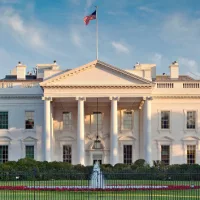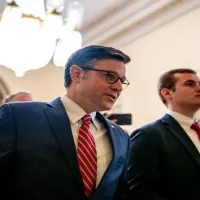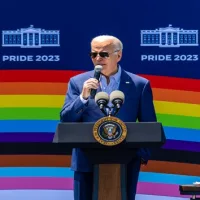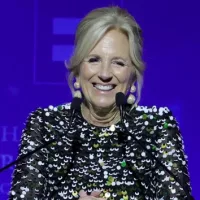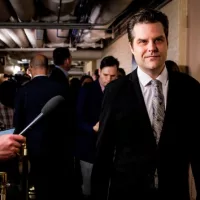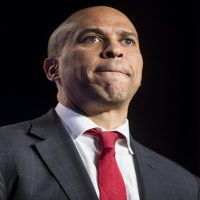
 Zach Gibson/Getty Images(NEWARK, N.J.) — Sen. Cory Booker, the high-profile Democrat who entered the 2020 race after a near-decade-long journey to become the second African-American president, returns to his native Newark, New Jersey for his first big campaign rally on Saturday.
Zach Gibson/Getty Images(NEWARK, N.J.) — Sen. Cory Booker, the high-profile Democrat who entered the 2020 race after a near-decade-long journey to become the second African-American president, returns to his native Newark, New Jersey for his first big campaign rally on Saturday.
“I believe that we can build a country where no one is forgotten, no one is left behind; where parents can put food on the table; where there are good-paying jobs with good benefits in every neighborhood; where our criminal justice system keeps us safe, instead of shuffling more children into cages and coffins; where we see the faces of our leaders on television and feel pride, not shame,” the New Jersey senator said in his official campaign announcement to supporters in February.
The 49-year-old’s kickoff event, which he called, “a moment that we’ve been building for since the start” in an email to supporters, is his first official rally as a presidential contender. The event launches Booker’s two-week “Justice for All” tour with the goal of building “a more just” country.
Booker is expected to highlight the defining challenges confronting the country and underscore the urgency needed to achieve “real and inclusive justice,” his campaign said in an email on Friday. He is also primed to highlight economic and environmental injustice, as well as injustice across voting rights, reproductive rights, education and gun violence.
The former Newark mayor’s long-standing commitment to fighting for criminal justice traces back to his formative years in the inner-city. On the campaign trail, he often invokes a common story about growing up as a young African-American in a predominantly white neighborhood. His message of unity derives from the city blocks of Newark — where he says young men are shot, hard-working Americans remain on food stamps and opportunity is often skewed towards the rich and powerful.
“I do live with a sense of urgency. I had a young man shot with an assault rifle on my block last year,” he said in a March interview with ABC News’ senior Washington reporter Devin Dwyer. “I go to my bodega around the corner from me and see people who work full-time jobs but still use food stamps. Every single day I live with that sense of urgency that we’ve got to solve these problems, and the knowledge that we can’t solve them divided.”
Booker ascended to the national political stage after over seven years as mayor of his hometown. He first vaulted into the national spotlight for his youth and his emphasis on combating crime in the poverty-plagued city. His unconventional hands-on approach included frequent ride-alongs with the city’s law enforcement and a high-profile education partnership with Facebook that involved Mark Zuckerberg investing $100 million into the city’s public school system.
“I’m the only one in this race who had to run and manage thousands of employees, a city in the middle of a recession, which was a depression for inner cities,” Booker told ABC News in that March interview. “We managed through crisis and we achieved things people said we couldn’t do. I’ve stayed put in the neighborhood where I first got my start and will never forget the people that believed in me and gave me my first chance.”
In crafting his narrative, Booker has pointed to his successes in transforming the downtown Newark, revamping the city’s recreational centers and starting a prisoner re-entry program, according to Andra Gillespie, a political scientist at Emory University and author of the 2012 book, “The New Black Politician: Cory Booker, Newark and Post-Racial America.”
But some of his critics argue that he did not always meet expectations or the hype around his mayoral tenure with some in the city’s inner core complaining that they were being left behind in the wave of gentrification and growth. There was also criticism that his burgeoning national profile meant that he spent less time in the city that buttressed his career.
The Newark Star-Ledger found that from Jan. 1, 2011 to July 2012, Booker spent 119 days out of the city–a span of time that included some speaking engagements, late-night television appearances, vacations and holidays.
“I think there is a double-edged sword of the celebrity [of Booker],” Gillespie told ABC News. “The celebrity was able to attract a lot of attention. … People focused on the hype. In terms of making a credible case of one he has executive experience and two the issues that he’s been talking about are issues he’s actually been thinking about for a long period of time, I think there’s a lot in Booker’s record that speaks to his investment and engagement with the issues he wants to champion as a presidential candidate.”
When asked which mayors he parallels, Gillespie put him in the same category as former Detroit Mayor Kwame Kilpatrick, former New Orleans Mayor Ray Nagin, and former Washington, D.C., Mayor Adrian Fenty, who were elected around the same time in cities also long run by African American mayors. She noted that among that cohort, Booker has seen the most success as a politician.
When Booker arrived on Capitol Hill after winning a special election in 2013, and re-election in 2014, his support for crucial reforms over the last few years led to his rise to national prominence, including for the recent landmark First Step Act, a bipartisan and significant, generational change to prison sentencing laws.
Criminal justice reform has been a hallmark of Booker’s public sector career. He was an original co-sponsor of the criminal justice reform bill.
Earlier this month, he said he aims to “get back to a country being about substance and not just sentiment.”
“We are dealing with systematic injustice in this country,” he said at the National Action Network Conference in New York. “What will happen to the dream of America on our watch? The dream of slaves for freedom? The dreams of suffragettes … what will become the dream of our nation?”
But Booker has also signaled his openness to other big structural reforms that are dominating the 2020 debate such as changing traditional Senate rules on the filibuster and reparations for African-Americans.
In late March, New Jersey’s junior senator said to the hosts of the “Pod Save America” podcast, “When you talk about changing the filibuster rule I understand that we are heading, right now, we are heading that way, to people on both sides. … I’m going to tell you that for me that door is not closed.”
Earlier this week, he introduced a bill in the U.S. Senate to form a commission to study reparations. His bill is a companion to H.R. 40, re-introduced this year by Democratic Rep. Sheila Jackson Lee, of Texas, and which could be a means to study the impact of slavery in a way that is “realistically forceful and effective to help African Americans who never had the issue of wealth that was inherited.”
“Since slavery in this country, we have had overt policies fueled by white supremacy and racism that have oppressed African Americans economically for generations,” he said. “[The bill] will bring together the best minds to study the issue and propose solutions that will finally begin to right the economic scales of past harms and make sure we are a country where all dignity and humanity is affirmed.”
Before then-Sen. Barack Obama captured the White House in the 2008 election, some in the Garden State were familiar with Booker’s ambitious work and him openly musing about becoming the country’s first black president.
The former Newark city council member was an early supporter of Obama’s presidential candidacy and shares his background in community organizing. He’s often drawn comparisons to the former president for his tenor on the trail and his message of optimism and love. Like many of the 2020 hopefuls, Booker hopes to garner the support of the Obama coalition — which requires a swath of southern black voters to win the Democratic nomination.
The co-chairman of Obama’s 2008 campaign in New Hampshire, James Demers, likened Booker to the former Illinois senator, calling him “Obama 2.0” for energetic ability to connect with voters, the Los Angeles Times reported.
While Booker first won his mayoral election unexpectedly, after unseating the longest-serving mayor in the city’s history, Sharpe James, his home state popularity is as strong as ever. Since announcing his bid for the White House, Booker is the only candidate in the deep field to secure the endorsement of every Democrat in his home state.
He earned the endorsements of more than 50 New Jersey Democrats, which includes New Jersey Gov. Phil Murphy, Lt. Gov. Sheila Oliver, his colleague, Sen. Bob Menendez, every Democratic member of the House, the top leaders of both state legislative chambers, all four Democratic county executives, Newark Mayor Ras Baraka, every member of the Newark City Council and all 21 county Democratic party chairs.
Copyright © 2019, ABC Radio. All rights reserved.






